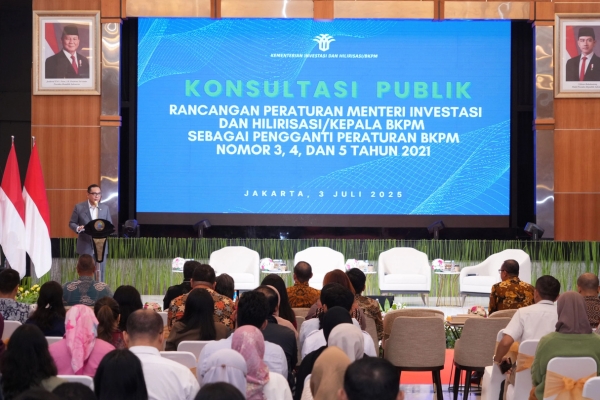Government Breakthrough in Business Licensing
The Indonesian government continues to accelerate business licensing reform as a strategic effort to improve the national investment climate. The latest innovation introduced is the implementation of the positive fiction principle (fikpos) in the business licensing system. This revolutionary mechanism allows permits to be automatically issued when there is no decision from authorized officials within the specified time limit.
Deputy Minister of Investment and Downstreaming/Deputy Head of the Investment Coordinating Board (BKPM) Todotua Pasaribu explained that the positive fiction principle aims to provide legal certainty to business actors in applying for permits through the OSS (Online Single Submission) system.
"The service level agreement concept we developed includes the positive fiction context to provide certainty to investors. With approximately 1,700 types of permits related to around 17 ministries or agencies, this mechanism is crucial," Todotua stated during the Public Consultation on the Draft Regulation of the Minister of Investment and Downstreaming/Head of BKPM in Jakarta, Thursday (03/07).
Economic Growth and Investment Targets
Business licensing reform is a vital component in the government's strategy to achieve a national economic growth target of eight percent over the next five years. To realize this ambitious target, the government targets investment realization of Rp13,000 trillion, consisting of Foreign Investment (PMA) and Domestic Investment (PMDN).
Todotua emphasized that business licensing is a crucial element in attracting investment. "The basic indicator in absorbing investment realization is the quality of licensing services. When discussing investment, everything starts with licensing," Todotua stressed.
Strengthening OSS Platform as Cross-Sector Consolidation
Besides accelerating the licensing process, the government also strengthens the role of OSS as the main platform for risk-based business licensing services. OSS not only functions as an administrative system but is developed into a cross-sector consolidation tool that integrates analysis, decision-making, and follow-up on licensing policies comprehensively.
"The OSS platform we manage is directed as a consolidation platform for services, analysis, and future strategic steps. There are still sectors that have not been fully integrated, and we are discussing this," Todotua explained.
Public Consultation and Regulatory Improvement
The public consultation held is an integral part of the process of drafting the Draft Regulation of the Minister of Investment and Downstreaming/Head of BKPM. This new regulation will replace BKPM Regulations Number 3, 4, and 5 of 2021, which have been the reference for implementing risk-based business licensing.
The event was attended in hybrid format by various stakeholders, including representatives from technical ministries/agencies, regional governments, business associations, MSME actors, and investors. Participants provided input regarding OSS implementation challenges in the field, the need for sectoral regulation harmonization, and the importance of strengthening regional government capacity.
Commitment to Regulatory Simplification
Three key speakers participated in the presentation and discussion session: Elen Setiadi (Deputy for Energy and Mineral Resources Coordination, Coordinating Ministry for Economic Affairs), Riyatno (Deputy for Investment Climate Development, Ministry of Investment and Downstreaming/BKPM), and Ricky Kusmayadi (Deputy for Investment Information Technology, Ministry of Investment and Downstreaming/BKPM).
Elen Setiadi emphasized that President Prabowo Subianto has instructed regulatory simplification. Government Regulation Number 28 of 2025 on the Implementation of Risk-Based Business Licensing is expected to prove the achievement of simplicity, certainty, and efficiency in the business licensing process.
"If this is not realized, it means our promise to the President before signing PP 28/2025 is not proven. We want to prove that the revision of PP 5/2021 reflects the principles of simple, certain, and efficient," Elen said.
Regulatory Harmonization and Legal Certainty
Elen also emphasized that derivative regulations prepared by ministries/agencies must follow the spirit of PP 28/2025. If there are regulatory differences between PP 28/2025 and ministerial or agency regulations, then PP 28/2025 and the Regulation of the Minister of Investment and Downstreaming will be the main reference.
"There is no more doubt from business actors when facing two regulations that are not aligned. The reference is PP 28/2025 and the Regulation of the Minister of Investment and Downstreaming that has been agreed upon by the government," Elen concluded.
Input from this public consultation will be considered in improving the regulatory draft, with the aim of forming a business licensing policy framework that is simpler, responsive to business sector dynamics, and capable of strengthening legal certainty and supervision effectiveness at all levels of government.


